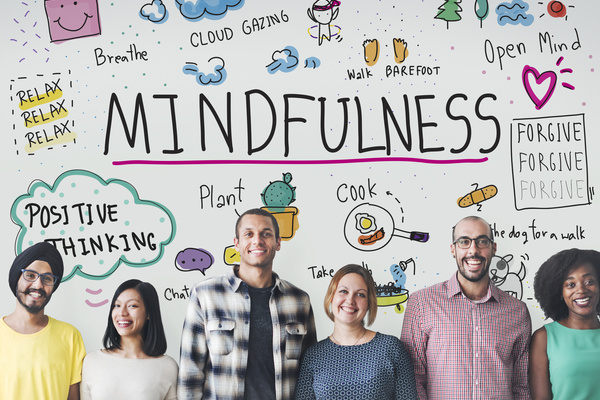What is mindfulness?
Mindfulness is a way of paying attention to what is happening in the present moment, being aware of what is going on, both inside and outside of ourselves.
Mindfulness helps us to manage our thoughts, it gives us the time to get them in order and not feel overwhelmed. It is easy to get caught up in our thoughts and we don’t stop to notice how they drive our emotions and behaviour.
Being in the moment and connecting with the sensations and experiences that are happening moment to moment are an important part of mindfulness as is being aware of our thoughts and feelings as they happen.
How mindfulness helps our mental wellbeing
Mental wellbeing doesn’t have one single definition, but it incorporates things such as feeling good about ourselves, being able to cope with the ups and downs of life, feeling valued and having a meaningful connection with your community and surroundings. This does not mean that we will never feel sad, angry or upset or experience other negative emotions that are part of normal life, instead it means that we are better at managing and being aware of our emotions.
Being aware of the moment, can help us to understand ourselves better, it allows us to stand back from our thoughts, and overtime we can start to notice when our thoughts are taking over.
Mindfulness can help us let go of negative thoughts and help us to deal with them proactively and can also help us to notice signs of stress or anxiety enabling us to deal with them better.
How can I learn mindfulness
You can easily become more mindful, by incorporating some of these easy techniques into your everyday life. Being mindful everyday can help us to break out of autopilot of everyday thoughts, it allows a pause in the things that maybe causing tension and unrest.
Breathing
Step out of the daily grind and allow some time to be present with yourself. Take a minute to observe your breathing, breathe in and out as you normally would, notice the time between each inhalation and exhalation, notice your lungs expanding. When your mind wanders gently bring it back to your breath.
Body Scan
Spend one minute bringing attention to your body and how it feels. Close your eyes and start scanning your body. Start with your feet, and then slowly bring your awareness upwards in your body until you reach your hands. What can you feel? Strain in your back, aches in your feet? Now move your focus away from your hands and focus on the environment and space around you.
Mindful walking
This can be practiced at any time and at any pace, start off slowly so that you get used to the technique. Walk slowly and become aware of your feet as they make contact with the floor, and any sensations in the leg muscles. When your mind wanders bring it back to the sensation of your feet on the floor, to bring you back to the present moment. Take a moment to take in the sensations generated by walking.
Mindful Eating
When you are eating, stop and observe your food, pay attention to it, really see it, the texture, the taste and the smell. When you take a bite, notice the taste and the texture, continue to chew and bring your attention to the taste of your food. If you mind drifts bring your attention back to your food.
Mindful listening
Take time and tune into the environment, listen to what it is telling you. It will help you bring mindfulness into your life and bring awareness as you move through the day. Stop and listen to the sounds, you don’t need to identify them, just absorb them and how they resonate with you, if you hear a sound you recognise, label it and move on, allowing your ears to catch new sounds.
Other ways to practice mindfulness
Practices such as yoga and tai chi, can be helpful for developing your breathing techniques and also take care of your physical health, they can be done alone or part of a group.
Meditation is another good technique and there are a number of apps available to download, which will take you through guided meditation. The apps are designed to help you use meditation for a range of situations, from an immediate need for head space in a stressful situation to helping to get a better night’s sleep.
How helpful is mindfulness?
Mindfulness is the not the answer to everything, so it is important to understand if you feel that you need help to manage your mental health.
If you are worried about your mental health or that of someone close to you, speak to your GP or one of the organisations below who will be able to help.
Mind – Help, advice and support around mental health
Tel: 0300 123 3393
Samaritans – support for people feeling distress or despair
116 123
Rethink Mental Illness Advice Line
0300 5000 927



